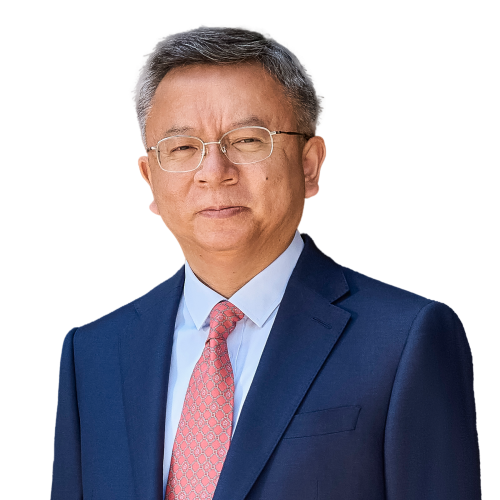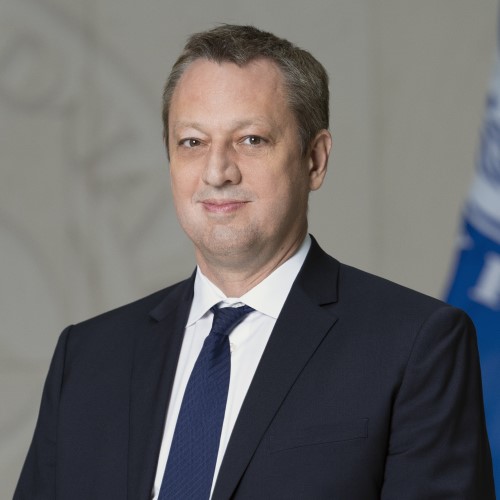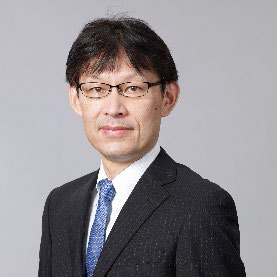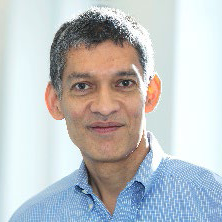Wednesday, Apr 12, 2023 | 12:30 PM - 01:30 PM
Location: Meeting Halls A&B, HQ1-3-430A&B
OVERVIEW
The global central banking community is actively exploring Central Bank Digital Currencies (CBDCs), which may have a fundamental impact on both domestic and international economic and financial stability. Several central banks have piloted or issued a CBDC. At the same time, CBDC is a new and rapidly evolving topic with limited real-world experience. Countries are looking for answers to questions and eager to share experiences and lessons. Over 40 member countries have requested the Fund’s assistance on CBDC. This seminar will discuss the global interest in CBDC, consider the increasing demand for IMF capacity development on CBDC, and highlight how the IMF can further help member countries through the development of a CBDC Handbook.
IMF Approach to Central Bank Digital Currency Capacity Development
OPENING REMARKS
 |
||
Bo Li Deputy Managing Director, IMF |
||
Bo Li assumed the role of Deputy Managing Director at the IMF on August 23, 2021. He is responsible for the IMF’s work on about 90 countries as well as on a wide range of policy issues. Before joining the IMF, Mr. Li worked for many years at the People’s Bank of China, most recently as Deputy Governor. He earlier headed the Monetary Policy, Monetary Policy II, and Legal and Regulation Departments, where he played an important role in the reform of state-owned banks, the drafting of China’s anti-money-laundering law, the internationalization of the renminbi, and the establishment of China’s macroprudential policy framework. Outside of the PBoC, Mr. Li served as Vice Mayor of Chongqing—China’s largest municipality, with a population of over 30 million—where he oversaw the city’s financial-sector development, international trade, and foreign direct investment. Mr. Li was also Vice Chairman of the All-China Federation of Returned Overseas Chinese. He started his career at the New York law firm of Davis Polk & Wardwell, where he was a practicing attorney for five years.
Mr. Li holds a Ph.D. from Stanford University and an M.A. from Boston University, both in economics, as well as a J.D., magna cum laude, from Harvard Law School. He received his undergraduate education from Renmin University of China in Beijing.
MODERATOR
 |
||
| Tobias Adrian IMF Financial Counsellor and Director of the Monetary and Capital Markets Department |
||
Tobias Adrian is the Financial Counsellor and Director of the Monetary and Capital Markets Department of the International Monetary Fund (IMF). In this capacity, he leads the IMF’s work on financial sector surveillance, monetary and macroprudential policies, digital money, financial regulation, bank resolution, debt management, capital markets, and climate finance. He also oversees capacity building activities in IMF member countries with regard to the supervision and regulation of financial systems, bank resolution, central banking, monetary and exchange rate regimes, central bank digital currency, and debt management. Prior to joining the IMF, Mr. Adrian was a Senior Vice President of the Federal Reserve Bank of New York and the Associate Director of the Research and Statistics Group. At the Federal Reserve, he contributed to monetary policy, financial stability policies, and to crisis management. Mr. Adrian has published extensively in economics and finance journals. His research spans macro-finance, monetary policy, financial stability, and climate finance, with a focus on aggregate consequences of capital markets developments. He has taught at Princeton University and New York University. He is member of the editorial boards of the International Journal of Central Banking and the Annual Review of Financial Economics. Mr. Adrian holds a Ph.D. from the Massachusetts Institute of Technology in Economics, an MSc from the London School of Economics in Econometrics and Mathematical Economics, a Diploma from Goethe University Frankfurt and a Maîtrise from Dauphine University Paris. He received
SPEAKERS
 |
||
Hideaki Imamura |
||
Hideaki Imamura is currently the Deputy Vice Minister of Finance for International Affairs in the Ministry of Finance, Japan, and responsible for digital assets issues and Asian regional financial cooperation. Mr. Imamura has over a decade of experiences in international finance, including G7/G20, IMF/MDBs, economic security issues, and foreign exchange policy. He previously held staff positions at the IMF and the Asian Development Bank, for nearly ten years in total. He holds a degree in Economics from the University of Tokyo and a Master’s degree in Applied Economics from the University of Michigan.
 |
||
Harvesh Kumar Seegolam |
||
Currently serving his second mandate, Mr Harvesh Kumar Seegolam was appointed Governor of the Bank of Mauritius on the 1st of March 2020. Upon assuming office when the COVID-19 pandemic hit Mauritius, Governor Seegolam swiftly took a series of bold decisions to salvage the Mauritian economy.
The criticality of his actions won him international recognition. The Banker conferred upon him the 2023 Central Bank Governor of the Year for Africa Award. In 2022, he obtained an A-rating in the Global Finance Central Banker Report Cards of the world’s leading central bankers. The modernization and the greening of the banking landscape is high on Governor Seegolam’s agenda. He has pioneered the Climate Change Centre, implemented a new Monetary Policy Framework and is driving the introduction of the Digital Rupee. Governor Seegolam is the current Chairperson of the Groupe des Superviseurs Bancaires Francophones, and is a key position holder in national, regional, and international high-level committees. Governor Seegolam holds a BSc (Hon) in Economics and a MSc in International Finance. He is an alumnus of the London School of Economics and Political Science, the University College London, Durham University, and the SKEMA Grande Ecole de Commerce in France.
Sopnendu Mohanty |
||
Sopnendu Mohanty, currently the Chief Fintech Officer at the Monetary Authority of Singapore, is responsible for creating development strategies, public infrastructure, and policies around technology-driven innovation. Mohanty has over two decades of public and private sector experience in technology, operations, digital Finance, and investment strategies. Mohanty extensively engages with global technology and financial services ecosystems and has championed notable collaborative public goods like API Exchange (APIX), Singapore Fintech Festival, Payment Rails, Data exchange platforms, and experimental programs like UBIN. In addition, Mohanty advises many international global advisory bodies on Fintech, Innovation and Inclusion. Within five years of his leadership, Singapore has become a leading global Fintech hub producing unicorns and home to many vibrant fintech companies. He has co-authored several patented works in the application of digital technology in Finance and won many industry recognitions.
 |
||
Eswar Prasad Tolani Senior Professor of Trade Policy and Professor of Economics at Cornell University |
||
Dr Eswar Prasad is the Tolani Senior Professor of Trade Policy and Professor of Economics at Cornell University. He is also a Senior Fellow at the Brookings Institution, where he holds the New Century Chair in International Economics, and a Research Associate at the National Bureau of Economic Research. He is a former head of the IMF’s China Division. Prasad’s latest book, The Future of Money: How the Digital Revolution is Transforming Currencies and Finance, was listed among the best economics books of 2021 by the Economist, the Financial Times, and Foreign Affairs. His previous books include Gaining Currency: The Rise of the Renminbi (Oxford, 2016) and The Dollar Trap: How the U.S. Dollar Tightened Its Grip on Global Finance (Princeton, 2014).
PHOTOS